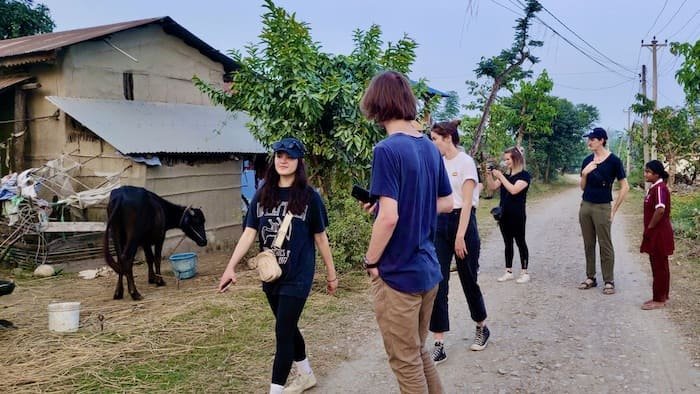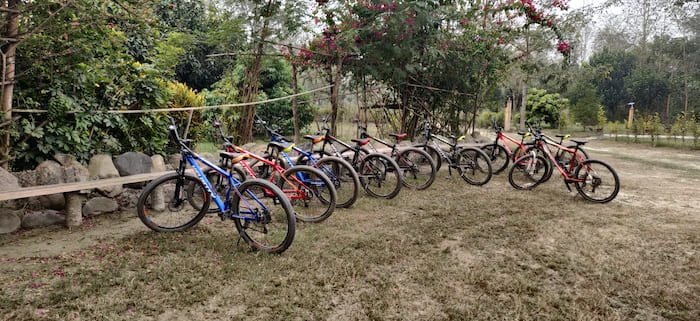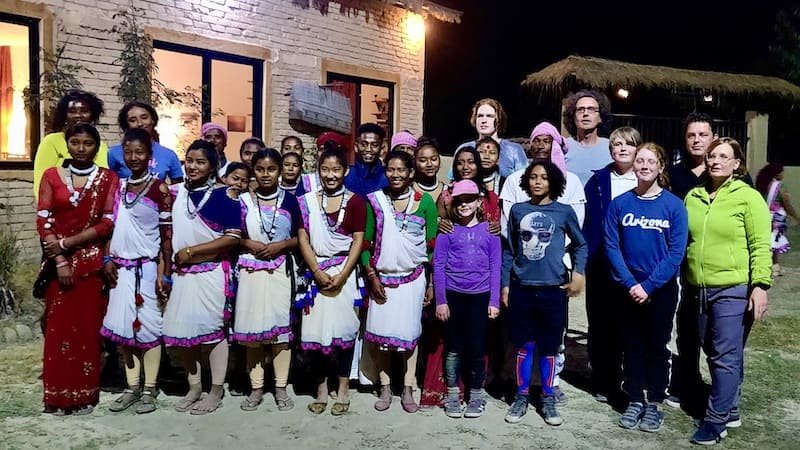Chitwan National Park serves as the ancestral homeland of the Tharu people, who are the indigenous tribe of this region. Until the late 1950s, they were the sole inhabitants of the Chitwan area. The Tharu people comprise multiple subgroups, each speaking different dialects and exhibiting variations in traditional attire, customs, rituals, and social structures. They strongly identify as a people of the forest. In the Chitwan region, they have dwelled within the forests for centuries, engaging in a form of short fallow shifting cultivation.
Their agricultural activities include the cultivation of rice, wheat, mustard, maize, and lentils. Additionally, they gather a wealth of forest resources, including wild fruits, vegetables, medicinal plants, and materials for constructing their homes. The Tharu community also practices hunting, targeting animals like deer, rabbits, and wild boars, and fishing in the rivers and oxbow lakes that grace their habitat.
Tharu Activities To Do in Chitwan
Chitwan offers a multitude of activities for those interested in experiencing the vibrant Tharu culture. One of the most captivating activities is the Tharu Cultural Show, where you can witness traditional dances, music, and performances that showcase the community’s rich heritage.
Additionally, guided village tours provide a chance to interact with Tharu locals, explore their daily lives, and gain insights into their customs and traditions. Travelers can also partake in bicycle tours, allowing them to explore uncharted Tharu villages and immerse themselves in the scenic countryside.
A visit to a Tharu homestay offers an authentic experience, letting you engage directly with Tharu families and savor their cuisine. These activities collectively provide a comprehensive and immersive introduction to the fascinating Tharu culture in the Chitwan region.
1. Tharu Stick Dance
Duration: 1 hour
The Tharu community is known for its vibrant cultural and traditional dances. It involves the use of both long and short sticks and are typically performed by local individuals. These dances play a significant role in representing various festivals and ceremonies within their culture.
One noteworthy Tharu dance is the “Sakhiya dance,” a traditional performance associated with the Tharu community. This dance is particularly prominent during the Dashain and Tihar festivals and involves the participation of unmarried young girls and boys. The Sakhiya dance holds cultural and celebratory significance within the Tharu community.
Another type of Tharu dance form is the “Lathi Nach,” also referred to as the “Tharu stick dance.” This cultural dance is predominantly showcased during the Dashain festival, one of Nepal’s most important celebrations. Lathi Nach has gained recognition as a popular tourist attraction, drawing visitors to the enchanting Chitwan District in Nepal. This dance showcases the artistic and rhythmic use of sticks, making it a unique and engaging cultural experience for both locals and tourists alike.
2. Tharu Village Walk

Duration: 2 hours max
Our guided village tour offers an enriching cultural journey into the simple lives the Tharu ethnic group. This experience offers a deep dive into their unique traditions and lifestyle. Renowned for their resistance to malaria, the Tharu community has been an integral part of the Chitwan region for generations.
Our village tour provides an immersive experience that allows you to delve into the rich tapestry of the local culture, traditions, religion, and heritage of the Tharu people. You will have the chance to visit their villages and take leisurely walks through the streets in the morning or evening.
This excursion provides a unique opportunity to engage with the Tharu community by visiting their homes, sharing tea, and conversing deeply to understand their way of life. This culturally immersive experience enriches your visit to Chitwan, connecting you with local traditions and heritage.
3. Tharu Bike Tour

Includes: Guide and Lunch
After breakfast, set out on a half-day or full-day bicycle excursion through the scenic Chitwan region. This adventure takes you through unexplored Tharu villages and hidden gems, offering a unique chance to immerse yourself in the charm of rural life.
As you pedal along, you’ll encounter the daily routines of the countryside, offering a firsthand glimpse into the authentic Tharu way of life. Take your time to relish these experiences and bear witness to the rich tapestry of local traditions and culture.
For lunch, enjoy a meal prepared by a Tharu family in their village, where you can savor regional flavors and experience the locals’ warm hospitality. After a restful break, your bicycle tour will resume, taking you back to our resort. This journey offers active exploration of the Chitwan region and a genuine connection with its people and landscapes, leaving you with memorable impressions of this unique cultural and outdoor adventure.
4. Tharu Cultural Museum
The Tharu Culture Museum offers visitors a look into the rapidly vanishing cultural and traditional practices of the Tharu community. The museum is organized around the three lifecycle stages of the Tharu people: pre-marital, marital, and post-marital, providing a unique perspective on their daily lives.
The museum features extensive exhibits, including paintings and display materials that illustrate the Tharu’s cultural rituals and agricultural practices throughout these lifecycle stages, alongside various antiquities and instruments. Additionally, the museum houses a Gurau clinic, managed by the Chitwan Tharu Traditional Knowledge Management Group. This clinic offers visitors an insight into the traditional healing practices of the Tharu, showcasing the community’s diverse medicinal methods.
Quick Tips While Visiting The Tharu Community
In your journey to explore the Chitwan region, it’s essential to embrace not only its natural beauty but also its vibrant culture and the warmth of its people, particularly the Tharu community. To help you navigate this cultural landscape respectfully, we’ve put together some essential guidelines for engaging with the local Tharu culture during your visit.
These tips will ensure that your experience is not only memorable but also meaningful, fostering a genuine connection with the people and traditions of Chitwan.
- To explore the beautiful surroundings of our lodge, you can use the provided map and opt for either a leisurely bike ride or a scenic walk.
- While enjoying your exploration, it’s essential to respect the local people and their privacy.
- We kindly request that you refrain from entering a house without an invitation and adhere to a modest dress code, covering your shoulders and knees when visiting villages.
- If you wish to capture the essence of your experience with photographs, please seek permission from the individuals you’d like to photograph. Not everyone may be comfortable with being photographed, and it’s considerate to show them the image on a digital camera, facilitating a friendly exchange. Children particularly enjoy seeing their pictures.
- In Nepal, greetings hold great significance, and locals typically use the word ‘Namaste’ while folding their hands in front of their forehead or chest as a sign of respect. Engaging in this traditional greeting is appreciated.
- Lastly, we kindly request that you refrain from offering money to the local people, as it aligns with our commitment to responsible and respectful tourism practices. Your understanding and consideration contribute to a more meaningful and culturally enriching experience for both you and the local communities you encounter.
Key Takeaways: Tharu Culture in Chitwan
The rich and vibrant Tharu culture in Chitwan offers an immersive experience like no other. As we’ve explored the traditions, customs, dances and the warm hospitality of the Tharu people, we invite you to take the next step. Come and be a part of these traditions by choosing Nana Jungle Resort’s accommodations or by embarking on our Tharu culture tour package.
By doing so, you not only enrich your own travel experience but also support the preservation of their unique heritage. Join us in celebrating the beauty and diversity of the Tharu culture, and let’s create memories together while making a positive impact on the local community!
